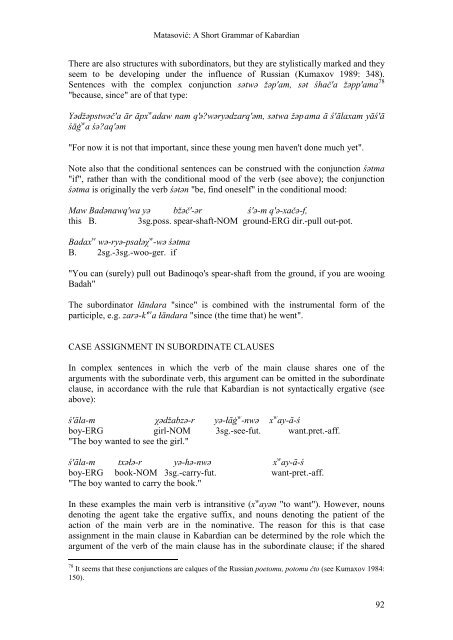PREGLED KABARDINSKE GRAMATIKE - Cryptm.org
PREGLED KABARDINSKE GRAMATIKE - Cryptm.org
PREGLED KABARDINSKE GRAMATIKE - Cryptm.org
Create successful ePaper yourself
Turn your PDF publications into a flip-book with our unique Google optimized e-Paper software.
Matasović: A Short Grammar of KabardianThere are also structures with subordinators, but they are stylistically marked and theyseem to be developing under the influence of Russian (Kumaxov 1989: 348).Sentences with the complex conjunction sətwə žəp'am, sət śhač'a žəpp'ama 78"because, since" are of that type:Yədžəpstwəč'a ār āpx w adaw nam q'ə?wəryədzarq'əm, sətwa žəpama ā ś'ālaxam yāś'āśāġ w a śə?aq'əm"For now it is not that important, since these young men haven't done much yet".Note also that the conditional sentences can be construed with the conjunction śətma"if", rather than with the conditional mood of the verb (see above); the conjunctionśətma is originally the verb śətən "be, find oneself" in the conditional mood:Maw Badənawq'wa yə bžəč'-ər ś'ə-m q'ə-xačə-f,this B. 3sg.poss. spear-shaft-NOM ground-ERG dir.-pull out-pot.Badax w wə-ryə-psałəχ w -wə śətmaB. 2sg.-3sg.-woo-ger. if"You can (surely) pull out Badinoqo's spear-shaft from the ground, if you are wooingBadah"The subordinator łāndara "since" is combined with the instrumental form of theparticiple, e.g. zarə-k' w a łāndara "since (the time that) he went".CASE ASSIGNMENT IN SUBORDINATE CLAUSESIn complex sentences in which the verb of the main clause shares one of thearguments with the subordinate verb, this argument can be omitted in the subordinateclause, in accordance with the rule that Kabardian is not syntactically ergative (seeabove):ś'āla-m χədžabzə-r yə-łāġ w -nwə x w ay-ā-śboy-ERG girl-NOM 3sg.-see-fut. want.pret.-aff."The boy wanted to see the girl."ś'āla-m txəłə-r yə-hə-nwə x w ay-ā-śboy-ERG book-NOM 3sg.-carry-fut. want-pret.-aff."The boy wanted to carry the book."In these examples the main verb is intransitive (x w ayən "to want"). However, nounsdenoting the agent take the ergative suffix, and nouns denoting the patient of theaction of the main verb are in the nominative. The reason for this is that caseassignment in the main clause in Kabardian can be determined by the role which theargument of the verb of the main clause has in the subordinate clause; if the shared78 It seems that these conjunctions are calques of the Russian poetomu, potomu čto (see Kumaxov 1984:150).92
















